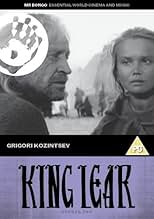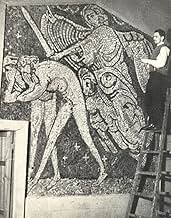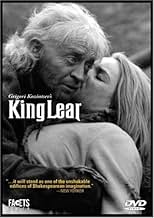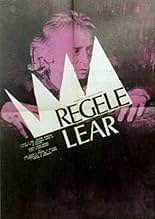NOTE IMDb
8,0/10
1,8 k
MA NOTE
Ajouter une intrigue dans votre langueA Soviet adaptation of a world-famous tragedy about an aged king and how cruelly he lose his illusions.A Soviet adaptation of a world-famous tragedy about an aged king and how cruelly he lose his illusions.A Soviet adaptation of a world-famous tragedy about an aged king and how cruelly he lose his illusions.
- Réalisation
- Scénario
- Casting principal
- Récompenses
- 2 nominations au total
Jüri Järvet
- King Lear
- (as Yuri Yarvet)
Elza Radzina
- Goneril
- (as E. Radzina)
Galina Volchek
- Regan
- (as G. Volchek)
Valentina Shendrikova
- Cordelia
- (as V. Shendrikova)
Karlis Sebris
- Gloster
- (as K. Sebris)
Leonhard Merzin
- Edgar
- (as L. Merzin)
Regimantas Adomaitis
- Edmund
- (as R. Adomaytis)
Vladimir Emelyanov
- Kent
- (as V. Yemelyanov)
Aleksandr Vokach
- Cornwall
- (as A. Vokach)
Donatas Banionis
- Albany
- (as D. Banionis)
Aleksey Petrenko
- Oswald
- (as A. Petrenko)
Juozas Budraitis
- King of France
- (as I. Budraytis)
Avis à la une
Just as Beethoven's late piano sonatas and string quartets represent the Everest for musicians so Shakespeare's monumental roles of Hamlet, Othello, Coriolanus, Macbeth and King Lear present the ultimate challenge to those actors brave enough, and fit enough, to take them on.
The play 'King Lear' makes no concessions to the spectator and its cruelty, misery and dark despair are unrelenting. Not for the squeamish certainly.
The 'Hamlet' directed by Grigori Kozintsev in 1964 is universally considered the greatest Shakespearean film adaptation whereas opinions of his 'Lear' are more sharply divided.
Lear is played by Yuri Yarvet, an Estonian whose voice is dubbed and whose portrayal is that of an irascible and querulous old man with nothing of the 'King' about him at all but that is evidently the way the director wanted it. One cannot fail however to be impressed by his performance as a father driven to distraction by the realisation that none of his three daughters loves him. We know of course that his favourite daughter Cordelia has never ceased to love him but this he discovers all too late. Valentina Shendrikova is simply stunning as Cordelia as are Galina Volchek as Regan and Elsa Radzina as Goneril who had previously impressed as Gertude in 'Hamlet'.
The whole cast is uniformly excellent and Kozintsev has again benefited from the stunning images of cinematographer Jonas Gritsius and a powerful score by Shostakovich which is especially impressive in the storm sequence.
English speaking Bardolators will obviously regret the abridged text and the loss of the glorious verse but Nobel Laureate Boris Pasternak has done a wonderful job here in realising the director's vision of a fragile society on the verge of collapse. Michael Pennington likened watching 'Lear' to being cast adrift and looking for help. It is all so grim that when Albany tells Goneril :"You are not worth the dust which the rude wind blows in your face" one wants to stand up and cheer!
Shakespeare was a renowned adaptor and he has here taken an Elizabethan melodrama entitled 'King Leir' and given us a searing Jacobean tragedy. In the original Cordelia is spared and Leir regains his throne but here Cordelia's murder and her father's death are the final hammer blows and it is little wonder that Samuel Johnson found the ending almost unbearable.
The only two left standing are Albany and Edgar so there is at least a glimmer of hope. Ben Jonson declared that " Shakespeare is for all the ages" and Lear's observation that "when we are born we cry that we are come into this great stage of fools" just about sums up the human condition.
The play 'King Lear' makes no concessions to the spectator and its cruelty, misery and dark despair are unrelenting. Not for the squeamish certainly.
The 'Hamlet' directed by Grigori Kozintsev in 1964 is universally considered the greatest Shakespearean film adaptation whereas opinions of his 'Lear' are more sharply divided.
Lear is played by Yuri Yarvet, an Estonian whose voice is dubbed and whose portrayal is that of an irascible and querulous old man with nothing of the 'King' about him at all but that is evidently the way the director wanted it. One cannot fail however to be impressed by his performance as a father driven to distraction by the realisation that none of his three daughters loves him. We know of course that his favourite daughter Cordelia has never ceased to love him but this he discovers all too late. Valentina Shendrikova is simply stunning as Cordelia as are Galina Volchek as Regan and Elsa Radzina as Goneril who had previously impressed as Gertude in 'Hamlet'.
The whole cast is uniformly excellent and Kozintsev has again benefited from the stunning images of cinematographer Jonas Gritsius and a powerful score by Shostakovich which is especially impressive in the storm sequence.
English speaking Bardolators will obviously regret the abridged text and the loss of the glorious verse but Nobel Laureate Boris Pasternak has done a wonderful job here in realising the director's vision of a fragile society on the verge of collapse. Michael Pennington likened watching 'Lear' to being cast adrift and looking for help. It is all so grim that when Albany tells Goneril :"You are not worth the dust which the rude wind blows in your face" one wants to stand up and cheer!
Shakespeare was a renowned adaptor and he has here taken an Elizabethan melodrama entitled 'King Leir' and given us a searing Jacobean tragedy. In the original Cordelia is spared and Leir regains his throne but here Cordelia's murder and her father's death are the final hammer blows and it is little wonder that Samuel Johnson found the ending almost unbearable.
The only two left standing are Albany and Edgar so there is at least a glimmer of hope. Ben Jonson declared that " Shakespeare is for all the ages" and Lear's observation that "when we are born we cry that we are come into this great stage of fools" just about sums up the human condition.
Shakespeare's plays are difficult to realize on stage or on film. Reading through his plays, one gets the impression that they are greater than they can ever be performed. But there are those few productions that hit the mark and do his works justice. So it is with Korol Lir (King Lear), Grigori Kozintsev's final film.
In 1964, Kozintsev's Hamlet was released and earned high praise both in Russia and the West. As a consequence, Kozintsev was invited to and attended many western film festivals including Cannes. Kozintsev cherished these trips to the west as he was able to see many films that were not shown in the Soviet Union. He was particularly eager to see the films of Kurosawa, Ford, Capra and Fellini. But it was the films of Orson Welles, Citizen Kane in particular, that made the deepest impression on him. In fact it was Citizen Kane that inspired Kozintsev to film King Lear in black-and-white rather than in color.
There are so many wonderful touches in this film starting with Yuri Yarvets' harrowing portrayal of the mad Lear. His Lear always leaves me feeling crushed at the end of the film. Superb as well is the eerie, haunting performance of Galina Volchek as Regan and the outstanding cinematography of Jonas Gritsius. Of course there is also the translation used which is itself a masterpiece, by Boris Pasternak no less (the fool's songs were performed with translations by Samuil Marshak however). Dmitri Shostakovich's score is exactly what you would expect: genius. Here is no simple sonic wallpaper to play along as images move about the screen. Neither does this dark score overwhelm the on-screen action but rather acts as a wordless narrator, commenting on the drama as it unfolds. At the heart of all this is Kozintsev's bleak and powerful vision of King Lear. There are no gimmicks here, no attempts to "update", no trace of the portentousness and pomposity that mars many films based on Shakespeare. Here, the tragedy is revealed with a brutal and simple honesty. It is not only Lear and those around him who suffer but his whole nation suffers and decays alongside him. Seeing this film from first to final scene is a draining emotional experience.
You probably won't find the DVD of this great film at your local video store but it is available from the Russian Cinema Council's (RUSCICO) website for about $35. Their transfer of this film is decent but it does leave a bit to be desired. One can only hope and pray that Criterion will release it one day (don't hold your breath). Still, any fan of great cinema should make the effort to acquaint themselves with this film, one that I personally consider to be one of the greatest films ever made.
In 1964, Kozintsev's Hamlet was released and earned high praise both in Russia and the West. As a consequence, Kozintsev was invited to and attended many western film festivals including Cannes. Kozintsev cherished these trips to the west as he was able to see many films that were not shown in the Soviet Union. He was particularly eager to see the films of Kurosawa, Ford, Capra and Fellini. But it was the films of Orson Welles, Citizen Kane in particular, that made the deepest impression on him. In fact it was Citizen Kane that inspired Kozintsev to film King Lear in black-and-white rather than in color.
There are so many wonderful touches in this film starting with Yuri Yarvets' harrowing portrayal of the mad Lear. His Lear always leaves me feeling crushed at the end of the film. Superb as well is the eerie, haunting performance of Galina Volchek as Regan and the outstanding cinematography of Jonas Gritsius. Of course there is also the translation used which is itself a masterpiece, by Boris Pasternak no less (the fool's songs were performed with translations by Samuil Marshak however). Dmitri Shostakovich's score is exactly what you would expect: genius. Here is no simple sonic wallpaper to play along as images move about the screen. Neither does this dark score overwhelm the on-screen action but rather acts as a wordless narrator, commenting on the drama as it unfolds. At the heart of all this is Kozintsev's bleak and powerful vision of King Lear. There are no gimmicks here, no attempts to "update", no trace of the portentousness and pomposity that mars many films based on Shakespeare. Here, the tragedy is revealed with a brutal and simple honesty. It is not only Lear and those around him who suffer but his whole nation suffers and decays alongside him. Seeing this film from first to final scene is a draining emotional experience.
You probably won't find the DVD of this great film at your local video store but it is available from the Russian Cinema Council's (RUSCICO) website for about $35. Their transfer of this film is decent but it does leave a bit to be desired. One can only hope and pray that Criterion will release it one day (don't hold your breath). Still, any fan of great cinema should make the effort to acquaint themselves with this film, one that I personally consider to be one of the greatest films ever made.
Even, relaxed performances. Tasteful, non-intrusive direction. No gimmicks. And finally a clear, even obvious! result.
This might seem like damning with faint praise, except that Kozintsev has done what Brook didn't, what Olivier's BBC production didn't, and what every stage production I have ever seen resolutely and spectacularly failed to do. That is to create order and clarity and meaning within arguably the greatest and arguably the most difficult play ever written. It seems easy to do in Kosintsev's version, which is one of his great triumphs. see it
This might seem like damning with faint praise, except that Kozintsev has done what Brook didn't, what Olivier's BBC production didn't, and what every stage production I have ever seen resolutely and spectacularly failed to do. That is to create order and clarity and meaning within arguably the greatest and arguably the most difficult play ever written. It seems easy to do in Kosintsev's version, which is one of his great triumphs. see it
10yavigad
Just finished watching the the 1971 version of Griogiri Kozintsev's King Lear and felt compelled to write my first ever IMDb review to recommend it to anyone who has the opportunity to see it. It was like stumbling across a rare treasure where not expecting it, and I just can't keep my mouth shut. I hadn't heard of the movie before and was doubtful about watching a dubbed version. This proved to be less of a distraction than I expected, and afforded me the opportunity of concentrating on the characterizations and visuals. It was an amazing interpretation of Shakespeare that brought to life the tragedy of Lear through sweeping scenery,breathtaking cinematography and Shakespearean acting as as good as any I've ever seen. I found the VERY Russian style invigorating after having watched countless BBC versions of Shakespeare. Not only did I get a greater appreciation for the original play, but by the last haunting scene I felt privileged to have watched a towering cinematic creation.
10dysandez
Back in high school, I had to watch this as we were studying King Lear in class.
Having watched both the Brooks and Olivier versions, I went in somewhat cautiously- I wasn't too fond of either, finding the Olivier version to be too colourful, and the Brooks version sombre.
This proved a sobering reminder of how truly spectacular cinematography can be if done correctly. This film gripped me like no other, and I watched riveted throughout.
The added Soviet focus on the peril of the peasant's, and the splendor of the palace helped to further heighten Lear's downfall. Chock-a-block full of brilliant performances, this has swiftly become one of my most treasured VHS tapes.
The only fault I could find was the somewhat tinny quality of the sound- but for a movie of the time, the quality was excellent.
A remarkable, truly moving film I recommend to everyone.
Having watched both the Brooks and Olivier versions, I went in somewhat cautiously- I wasn't too fond of either, finding the Olivier version to be too colourful, and the Brooks version sombre.
This proved a sobering reminder of how truly spectacular cinematography can be if done correctly. This film gripped me like no other, and I watched riveted throughout.
The added Soviet focus on the peril of the peasant's, and the splendor of the palace helped to further heighten Lear's downfall. Chock-a-block full of brilliant performances, this has swiftly become one of my most treasured VHS tapes.
The only fault I could find was the somewhat tinny quality of the sound- but for a movie of the time, the quality was excellent.
A remarkable, truly moving film I recommend to everyone.
Le saviez-vous
- AnecdotesGrigoriy Kozintsev made this version of the play at the same time that Peter Brook was filming Le Roi Lear (1970), and the two directors corresponded with each other throughout shooting.
- ConnexionsFeatured in King Lear (1987)
Meilleurs choix
Connectez-vous pour évaluer et suivre la liste de favoris afin de recevoir des recommandations personnalisées
Détails
- Durée2 heures 20 minutes
- Couleur
- Mixage
- Rapport de forme
- 2.35 : 1
Contribuer à cette page
Suggérer une modification ou ajouter du contenu manquant


































